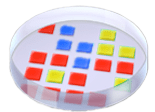WAVES Workshop Outcomes
It’s that most wonderful time of year — grant reporting season for the WAVES Workshop! A time to reflect on the accomplishments of the workshop and record them for the benefit of postererity. (Oh, and for NSF administrators too!) I thought I’d take a moment to share the blurb on WAVES outcomes we prepared for this year’s Active LENS grant annual report. I’ve tucked in the 2020 blurb, too, further down below.
🔗 2021 Report
This year, we reprised a major initiative that we introduced in 2020 in response to the cancellation of many undergraduate internships: a full-remote software development workshop—Workshop for Avida-ED Software (WAVES). The goal of the workshop is four-fold:
- to help participants advance their careers by skillbuilding through hands-on C++ and/or JavaScript software development, with a special focus on supporting members of historically underrepresented groups in computer science,
- to catalyze effective science communication and science pedagogy by helping participants develop the know-how to showcase their research through interactive web applications,
- to jumpstart software development on web framework and core digital evolution tools in support of the next version of the Avida-ED scientific and educational software, and
- to produce software that broadly enriches the digital evolution, scientific, education, and open-source communities. to provide a learning opportunity for undergraduate CS majors, especially ones from underrepresented groups.
The cornerstone of participants’ educational outcomes was one-on-work with an assigned graduate student or faculty mentor on a project of mutual choosing. Eight mentors participated in the program, leading projects ranging from algorithm design, to web design, to documentation and testing. Some participants — like Yemi Shin, who worked with Dr. Diane Blackwood to incorporate touch device support— developed software explicitly tailored for Avida-ED. Other participants — like Tait Weicht, who worked with Matthew Andres Moreno to continue work on a C++ interface for mobile-friendly web design — developed more general software tools that will directly support Avida-ED but have more general applicability. Each participant wrote a blog post summary of their project. (A full listing of blog posts is available at https://mmore500.com/waves/blog.html.)
To bring students up to speed with technical skills for their projects, we began the workshop with a one-week series of asynchronous tutorials introducing Avida-Ed, C++, and web design. (A full listing of tutorials is available at https://mmore500.com/waves/tutorials.html.) In addition to these tutorials, participants broadened their scientific and technical horizons through topic-driven enrichment seminars. These seminars were held for 90 minutes on a weekly basis. (A full listing of enrichment sessions available at https://mmore500.com/waves/enrichment.html.) We also held weekly group meetings with breakout sessions to check in on student progress, troubleshoot barriers, and spitball ideas. We assessed a pre- and post-survey of participants to quantify learning outcomes. We look forward to completing our analysis of learning outcomes in the upcoming weeks.
We hosted 10 participants. (A directory of our participants, including a brief biographical sketch for each, is available at https://mmore500.com/waves/people.html.)
Five participants identified as women (50%). Five participants identified as men (50%). One participant identified as Korean (10%), one identified as Vietnamese (10%), two identified as Other Asian (20%), and eight identified as White (80%). Three participants identified as LGBTQIAP (30%). One participant identified as first-generation (10%). A majority of our participants — 7 out of 10 (70%) — were members of an underrepresented group in computer science.
🔗 2020 Report
COVID-19 caused the cancellation of many undergraduate internships and we decided to offer an on-line software development workshop—Workshop for Avida-ED Software (WAVES)—to provide a learning opportunity for undergraduate CS majors, especially ones from underrepresented groups. As with our faculty workshop, this was done entirely online.
The cornerstone of participants’ educational outcomes was one-on-work with an assigned graduate student or faculty mentor on a project of mutual choosing. Thirteen mentors participated in the program, leading projects ranging from algorithm design, to web design, to education and social science. Some participants — like Raheem Clemmons, who worked with Dr. Diane Blackwood to build a drag-and-drop framework — developed software explicitly tailored for Avida-ED. Other participants — like Sara Boyd, who worked with Matthew Andres Moreno to build a C++ interface for mobile-friendly web design — developed more general software tools that will directly support Avida-ED but have more general applicability. Each participant wrote a blog post summary of their project. (A full listing of blog posts is available at https://mmore500.com/waves/blog.html.)
To bring students up to speed with technical skills for their projects, we began the workshop with a one-week series of asynchronous tutorials introducing Avida-Ed, C++, and web design. (A full listing of tutorials is available at https://mmore500.com/waves/tutorials.html.) In addition to these tutorials, participants broadened their scientific and technical horizons through topic-driven enrichment seminars. These seminars were held for 90 minutes on a weekly basis. (A full listing of enrichment sessions available at https://mmore500.com/waves/enrichment.html.) We also held weekly group meetings with breakout sessions to check in on student progress, troubleshoot barriers, and spitball ideas. We assessed a pre- and post-survey of participants to quantify learning outcomes. We look forward to completing our analysis of learning outcomes in the upcoming weeks.
We hosted 17 participants, one of whom associated with the workshop on a volunteer basis. (A directory of our participants, including a brief biographical sketch for each, is available at https://mmore500.com/waves/people.html.)
Ten participants identified as women (59%). Seven participants identified as men (41%). Three participants (18%) identified as of Hispanic, Latino, or Spanish Origin. Three participants identified as Black or African-American (18%), one identified as Asian Indian (6%), two identified as Chinese (12%), and twelve identified as White (71%). One participant identified as a first-generation college student (6%). A majority of our participants — 13 out of 17 (76%) — were members of an underrepresented group in computer science.
